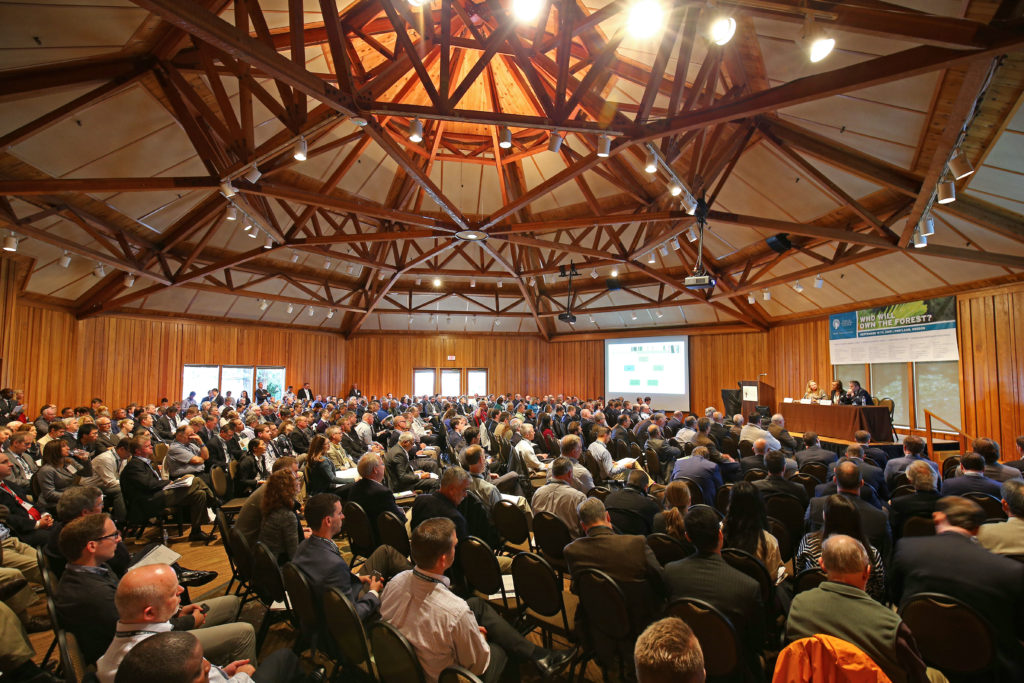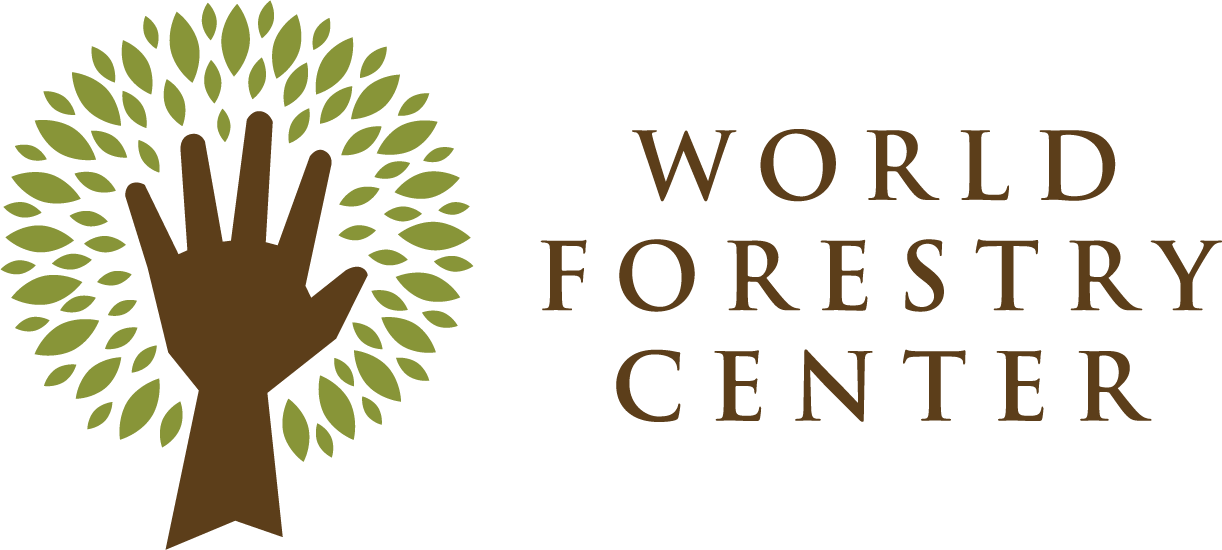Tuesday, September 24
5:00 – 8:00 pm Opening Reception and Check-in in Museum
Enjoy appetizers, drinks, and exhibits while networking inside our Discovery Museum.
Wednesday, September 25
8:00 am Women in Timber Breakfast Social in Cheatham Hall
8:00 am Breakfast, Conference Check-in, and Conference Sessions in Miller Hall
8:40 am Introduction & Welcome Remarks
- Joe Furia, Executive Director, World Forestry Center
Session 1: Keynote
Dates and times below are subject to change as we confirm additional speakers and topics.
8:50 am Keynote
Forests as an asset class have gone from being a boutique investment to a mainstream alternative asset in institutional portfolios. Timberland’s potential as a natural capital investment that can potentially help to address climate change and other ecological and social issues has recently made it even more appealing. This session asks panelists what investment portfolio functions timber can reasonably achieve then delves into an honest exploration of the recalibration of investor expectations and manager representations that would create closer alignment between these two groups.
- Moderator: Bob Saul, Owner, Shearwell
- Jim Hourdequin, Managing Director and CEO, The Lyme Timber Company
- Will Sonnenfeld, Principal, WillSonn Advisory
- TBA
Session 2: Wood Supply Baskets
9:50 am Pulp and Paper Mill Closures in the US South: Drivers, Trends and Impact for Private Timberland Owners, Downstream Consumers, and Others
While the US South enjoys abundant forest resources and continuing investment in wood processing facilities, the region has seen many pulp and paper mills close, eroding markets for some small wood growers and jobs for local communities. What factors are driving this shift across the US South? How do these closures impact timberland owners, investors, and downstream pulp and fiber consumers? What are the social and silvicultural impacts? Can the biofuels sector replace the demand lost with the mill closures?
- Moderator: Laura Calandrella, Executive Director, Keeping Forests
- Lee Alexander, Vice President of Global Fiber Supply, International Paper
- Chung-Hong Fu, Founding Member and Partner, Timberland Investment Resources
- Vernon Hiott, Senior Vice President of Land Resources & Business Development, Rayonier
- David LaMont, Senior Vice President of Corporate Development, SunGas Renewables
- Brooks Mendell, President and CEO, Forisk Consulting
10:50 am Morning Break
11:20 am Northwest Log Supply Trends
Since the listing of the Spotted owl in the 1990s, log supply in the Northwest has been on the decline. Wildfire damage, pine beetle infestations in Canada, Oregon’s Private Forest Accord and Habitat Conservation Plan, and growing regulatory interest in emphasizing carbon over timber harvesting on public forests in Washington present continuing constraints on log supply in the Pacific Northwest. What is the long-term trend for log supply in this region, and how will this impact private timberland owners, wood processors, lumber trade and forest-dependent communities? Who stands to benefit and who stands to lose?
- Moderator: Joe Taggart, President, LandVest
- Steve Courtney, Vice President of Operations, Beck Group Consulting
- Dave Kunert, Vice President of Resources, Hampton Lumber
- Todd Payne, President of Lumber, Sierra Pacific Industries
- TBA
12:20 pm Lunch served in Plaza
Session 3: Regulatory Drivers in Climate and Environmental Action
1:30 pm Emerging Formal and Informal Regulations on Biodiversity and Other Environmental Values –Implications for Working Forests and Investors
Halting and reversing global biodiversity and generating nature-positive impacts is a growing focus of policymakers and investors globally. The Task Force on Nature-related Financial Disclosures (TNFD) and the Science-Based Targets Network (SBTN) seek to guide disclosure of nature-related risks and nature-related target setting, while initiatives like 30 x 30, the EU Biodiversity Strategy, and the UK Biodiversity Net Gain regulations seek to drive governmental and private sector action. Many in the forest sector have long maintained that well-managed working forests can provide significant benefits for biodiversity and other environmental values. What are the implications of these emerging formal and informal regulations for working forests and investor behavior? What are the prospects for biodiversity credits and other incentives for nature-positive action?
- Moderator: Ross Holbrook, Sustainability Manager, Forest Investment Associates
- Gerrity Lansing, Managing Director and Partner, BTG Pactual
- Asger Strange-Olesen, Global Head of Climate, Biodiversity, and ESG, International Woodland Company AM+
- TBA
2:30 pm Flight to Quality: Implications for Forestland Owners and Carbon Buyers and the Broader Implications for Forests in Addressing Climate Change
The growth of the carbon markets has presented opportunities and challenges for forestland owners, including shifting methodologies, emerging quality standards, regular attacks from journalists, and buyer preference for removals. This panel will explore these changes and learn how forestland owners, project developers, and carbon buyers can best position forest carbon projects to navigate these emerging complexities and shifting perceptions of integrity. Hear how one forestland owner, buyer, and ratings agency are working together to improve project design and reduce implementation risk.
- Moderator: Bettina von Hagen, Co-Founder and CEO, EFM Investments & Advisory
- TBA
3:20 pm Afternoon Break
Session 4: Investor and Manager Alignment
3:50 pm Creating Alignment Between Investors and Investment Managers
Forestland investment has inherited a private equity model for performance fees and ownership structure, but is this ideal? How do we ensure these structures incentivize the kind of actions that deliver business and impact metrics for this real asset class with unique characteristics?
- Moderator: Carter Coe, Managing Partner, Chinook Forest Partners
- Tom Goodrich, Senior Advisor, The Lyme Timber Company
- Charles-Hugo Lajeunesse, Senior Associate of Sustainable Land Management, CDPQ Global Infrastructure
- Hill Jeffries, Partner, Eversheds Sutherland
- TBA
Session 5: TBA
4:50 pm Climate Risks for Timberland Investors: Recognizing Nature-Based Risks, not just Nature-Based Solutions
As an asset class, timberland has been increasingly framed as a “Nature Based Solution” or a “Natural Climate Solution”, providing carbon sequestration, clean air, clean water, and biodiversity refuges, all of which are of increasing importance in the face of climate change. While part of the climate solution via mitigation, timberland is also exposed to negative climate impacts, which are already here and only growing, thus requiring adaptation.
- Moderator: Spenser Shadle, Managing Director, Alder Point Capital
- TBA
5:30 – 8:00 pm Outdoor Reception in Miller Garden
Thursday, September 26
8:00 am Conference Check-in and Breakfast in Miller Hall
Dates and times below are subject to change as we confirm additional speakers and topics.
9:00 am Introduction & Welcome Remarks
- Joe Furia, Executive Director, World Forestry Center
Session 6: Mass Timber
9:10 am Fireside Chat on Locally Sourced Mass Timber: PDX and Jamestown Discuss Pulling off a Forest-to-Table Project
Developers of recent mass timber projects in Oregon, Canada and Georgia talk about the challenges they faced in building mass timber commercial projects, why they believe the opportunities outweigh those challenges for their individual projects, and what will need to change in order for mass timber projects to scale.
- Moderator: TBA
- Troy Harris, Managing Director of Timberland and Innovative Wood Products, Jamestown
- Curtis Robinhold, Executive Director, Port of Portland
10:00 am Morning Break
Session 7: Technology
10:30 am Emerging Technologies in Forest Monitoring: Credibility and Risks for Investors and Managers
Technology is advancing faster than regulation, even as societal demands for real time forest assessments and monitoring increase. Newer methodologies and tools such as LiDAR, drones, AI forest-mapping, eDNA and acoustic monitoring can increase inventory accuracy and allow us to improve monitoring for tree growth, mortality, biodiversity, carbon stocks, forest health and habitat. What benefits do these new technologies offer? What are the risks landowners and managers need to be aware of when using these technologies? How do they mitigate risk exposure over the long term, as technologies advance beyond original commitments made years earlier using older technology?
- Moderator: Will Autrey, Director of Technical Services, Larson & McGowin
- Peter McHale, Co-Founder and CEO, GAIA AI
- TBA
Session 8: TBA
11:20 am TBA
12:00 pm Lunch served in Plaza
1:00 pm End
Meet the Speakers
CANOPY features leading voices from across diverse sectors. Learn more about them.


